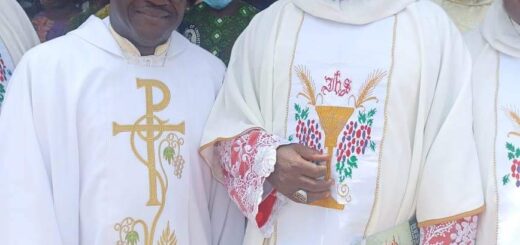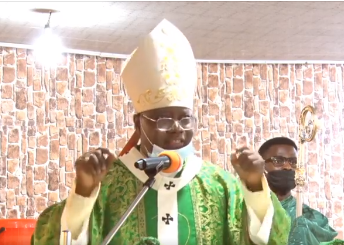Self-Sacrificing Love
by ARCH BISHOP · March 17, 2024
Fifth Sunday of Lent, Year B, 17th March 2024, Saints Peter and Paul Parish, Nyanya, Abuja. Homily by Archbishop I.A. Kaigama.
READINGS: Jer. 31:31-34; Ps. 50(51): 3-4, 12-15; Heb. 5: 7-9; Jn. 12:20-33
Self-Sacrificing Love
It appears as if it was just a few weeks ago that we pulled down our Christmas decorations! Easter is already knocking! Next Sunday is Palm Sunday, which begins Holy Week. Our readings are already pointing to the reality of the cross. The Church shifts her focus from Christ in the desert to Christ during His Passion.
The readings of today call us to follow the way of Christ’s self-sacrifice to share in the glory of His resurrection. We are aware of the common saying, “No cross, no crown”. The Stations of the Cross we pray, especially during Lent, are an eloquent reminder that through the Cross, we can be exalted and glorified with Christ.
Prophet Jeremiah in the first reading teaches that the former covenant on Sinai and other covenants were marked by disobedience and unfaithfulness on the part of the people. He declared that the new covenant between God and Israel would no longer be external and written on stones (cf. Ex 24:11), but spiritual and written deep within their hearts (cf. Jer. 31:33), where no rain or natural disaster can affect it. This will lead to a change of old hearts to newer ways of keeping God’s covenant.
The second reading from Hebrews focuses on how Jesus learned obedience through suffering and became the source of salvation for all who obey Him (cf. Heb. 5:8-9). From the example of Jesus, we learn that through suffering and fidelity to God’s will, our souls are sanctified, and eternal glory is attained.
In the Gospel reading, some Greek pilgrims came to Jerusalem for the Passover feast to see Jesus and approached Philip to facilitate the visit (cf. Jn. 12:21). Philip went to tell Andrew and Andrew and Philip together went to tell Jesus. The wish of the Greeks to see Jesus, represents humanity’s quest and inner longing for God. The Greeks, by going through Philip, and later Andrew, remind us of our roles as disciples of Christ – to lead others to Christ. Some persons might want to approach Jesus, but do not know how to go about it. As Christians, our role is to lead people to Jesus. Some, perhaps are trying to retrace their steps, back to Christ. Our responsibility is to help them find the way, not to lead them farther away from Him by our bad examples.
Jesus in today’s Gospel, by using the imagery of a grain of wheat, which bears much fruit only when it falls to the earth and dies, teaches us that the price of eternal life is sacrifice. Jesus paid the supreme sacrifice on the cross. It is only by dying to self that we live better and happier lives. A grain dies to regenerate, so we die every day when we stand up for justice, and truth and when we say no to sin, corruption, and immorality.
Jesus had to die on the cross to bring us reconciliation and forgiveness of sins. The Cross of Jesus is the gateway to the Kingdom of God. At Calvary, the Cross gave access to heaven to the repentant thief. The cross also helps us to bear good fruits while on this earth.
Jesus declared in today’s Gospel that His soul is troubled. Many things trouble us in our country: the high inflation and ravaging hunger, crime, insecurity, moral decadence, corruption, poverty, disease, etc., all throw us into depression and misery. We must however, take these to God in prayer and seek His help as “the Lord is close to the broken-hearted and saves the crushed in spirit” (Ps. 34:18).
We must all pay attention to the voice of God in our consciences. The degree of rot and blatant misuse of public resources of this great country is because many have allowed their conscience to die. They see no wrong in their evil actions. They rationalize sin and criminally take for themselves what belongs to all.
Dying to self is the only way a new Nigeria will germinate and grow, to produce patriotic citizens who do nothing from selfish ambition; not looking only for their interests, but also the interests of fellow Nigerians (cf. Phil 2:3-4). If Nigerians avoid politics of pleasure and the mentality of leadership without sacrifice, far-reaching positive changes will be possible.
Unfortunately, in the struggle to occupy lucrative leadership positions, some leaders don’t care if others die for their (leaders’) political ambitions, while they are comfortable with their families at home, or having their children well protected overseas. It is only by dying to self that good governance can be entrenched. Jesus warns that “he who loves his life, loses it, and he who hates his life in this world will keep it for eternal life.”
We must intensify prayers for our leaders who handle our resources, so that they will develop the spirit of selflessness and direct the humongous resources consumed by the high cost of governance and the “maintenance” of leaders, to improve the lives of the suffering Nigerians.
I urge the 257 candidates who will receive the sacrament of confirmation to be soldiers of Christ without counting the cost. Life consists of self-sacrifice. It is not what we take up, but what we give up. Live your life not only thinking about yourself but also the good of others.
I invoke God’s blessing upon the entire parishioners of Saints Peter and Paul Parish, Nyanya, your parish priest and assistant Fr. Louis Duniya and Fr. Benjamin Okenwa respectively.
May God give us all the grace of true obedience to His will, enable us to make sacrifices for the common good, and may He create a pure heart in us all.




